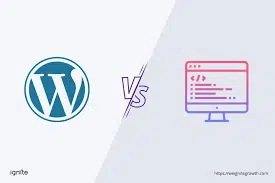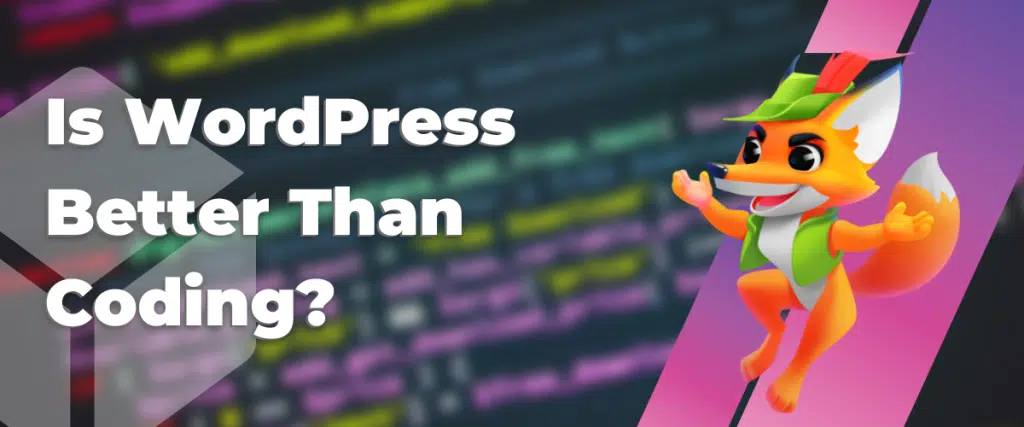
is wordpress better than coding
Whether it is better to code a website or use WordPress depends on several factors and your specific needs. Let’s explore the advantages and considerations of each option:
Coding a Website:
- Customization: Coding a website allows for complete control over every aspect of its design and functionality. You can tailor it to your specific requirements and create a unique user experience.
- Scalability: By coding a website, you have the flexibility to scale and expand it as your needs grow. You can optimize performance, add features, and accommodate future changes easily.
- Performance: Hand-coded websites can be highly optimized for speed and performance, resulting in faster load times and a smoother user experience.
- Learning Opportunity: If you are interested in web development or programming, coding a website provides an excellent learning opportunity. You can gain a deeper understanding of web technologies and enhance your programming skills.
Using WordPress:
- Ease of Use: WordPress is a user-friendly content management system (CMS) that allows non-technical users to create and manage websites with ease. It provides a range of pre-built themes, templates, and plugins to simplify website development.
- Rapid Development: WordPress’s extensive collection of themes and plugins enables quick website development. You can leverage existing solutions rather than building everything from scratch, saving time and effort.
- Content Management: WordPress excels in content management, making it ideal for blogs, news sites, and content-driven websites. Its intuitive interface makes it easy to create, publish, and manage content.
- Community and Support: WordPress has a large and active community of developers and users. You can find support, tutorials, and resources to troubleshoot issues, enhance functionality, and keep your website up to date.

In summary, coding a website provides maximum control, customization, and scalability but requires technical expertise. WordPress, on the other hand, offers ease of use, rapid development, and strong content management capabilities, but with some limitations on customization. Consider your technical skills, time constraints, and specific project requirements to determine which option is better suited for your needs.
Do professional web developers use wordpress?
Yes, real programmers do use WordPress. While WordPress is often associated with non-technical users or beginners, it is also used by experienced developers and programmers. WordPress is a powerful content management system (CMS) that allows for extensive customization and flexibility through its theme and plugin ecosystem.
Programmers may use WordPress for various reasons:
- Custom Theme Development: Programmers can create their own custom WordPress themes using PHP, HTML, CSS, and JavaScript. This allows them to leverage the WordPress infrastructure while building unique and tailored websites.
- Plugin Development: WordPress offers a plugin architecture that enables programmers to develop custom functionality and extend the platform’s capabilities. Programmers can write their own plugins using PHP to add specific features or integrate with third-party services.
- Web Application Development: With WordPress, it is possible to build more than just a simple website. Programmers can leverage WordPress as a foundation to develop complex web applications, such as e-commerce stores, membership sites, forums, and more.
- Maintenance and Optimization: Programmers may work on optimizing and maintaining WordPress websites, improving performance, security, and scalability. They can dive into the codebase to debug issues, enhance security measures, and optimize the website’s performance.
- WordPress API Integration: WordPress provides RESTful APIs that allow programmers to integrate WordPress with external systems, create mobile apps, or connect with other platforms and services.
- Freelance or Client Work: Many programmers work as freelancers or in agencies and cater to clients who use WordPress. They develop custom themes, plugins, and solutions tailored to the clients’ requirements.
While some developers prefer to work with other CMSs or build websites from scratch, WordPress remains a popular choice due to its user-friendly interface, large community support, and extensive ecosystem of themes and plugins. The decision to use WordPress ultimately depends on the specific requirements of the project and the preferences of the programmer.
why developers hate wordpress
While it’s not accurate to say that all developers hate WordPress, there are some common reasons why certain developers may have reservations or frustrations when working with it. Here are a few reasons that can contribute to this sentiment:
- Limited Control and Flexibility: WordPress is a platform that aims to be user-friendly and accessible to non-technical users. As a result, it can have limitations and constraints when it comes to customization and flexibility. For developers who prefer complete control over every aspect of a website or who are used to building applications from scratch, these limitations can be frustrating.
- Performance and Optimization Challenges: WordPress can be resource-intensive, especially if the website uses numerous plugins or poorly coded themes. Achieving optimal performance and scalability can require additional effort and knowledge. Developers who prioritize performance may find themselves spending time optimizing and tweaking their WordPress sites.
- Security Concerns: WordPress is a popular target for hackers due to its widespread usage. Security vulnerabilities can arise from outdated themes or plugins, weak passwords, or improper configurations. Developers often need to invest time and effort into securing a WordPress site, staying vigilant with updates, and implementing security best practices.
- Code Quality and Standards: Because WordPress is open-source and has a vast community of developers, the quality of themes and plugins can vary significantly. Developers may encounter poorly coded themes or plugins that do not adhere to coding standards or best practices. This can make it challenging to work with or modify existing themes and plugins.
- Learning Curve: While WordPress aims to be user-friendly, developers who are accustomed to working with other frameworks or coding from scratch may find it initially frustrating to adapt to WordPress’s way of doing things. The learning curve can be steep, especially when working with the WordPress-specific APIs and hooks.
- Maintenance and Updates: WordPress releases regular updates to address security vulnerabilities, introduce new features, and improve performance. However, these updates can sometimes cause compatibility issues with themes and plugins, requiring developers to spend time testing and updating their code to ensure everything works smoothly.
- Community Support: While WordPress has a large and active community, it can be challenging to find reliable and up-to-date information or solutions for specific development challenges. Sorting through outdated or conflicting advice can be frustrating for developers seeking assistance.
It’s important to note that these frustrations are not universal, and many developers successfully work with WordPress and appreciate its advantages, such as its ease of use, extensive plugin ecosystem, and the ability to quickly set up websites. Ultimately, developers’ preferences and choices depend on their specific needs, experience, and project requirements.


